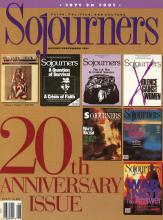Sojourners are odd in a society where everything is settled. Sojourners are threatening where everyone imagines that they are "at home." Sojourners are a source of unwelcome reminder in a context of agreed-upon forgetfulness, endlessly recalling what we thought had been safely jettisoned.
It is difficult to imagine the convulsive context in which Sojourners first emerged 20 years ago. Our society was in the thick of "war protest" and "civil rights," and violence, fear, brutality, and heavy estrangement. There were, to be sure, a lot of long-haired "weirdos" around who responded to the social emergency too easily and thoughtlessly, and without much staying power. Sojourners Community, along with other weirdos, was birthed in that defining upheaval and made common cause with the larger, mostly undisciplined restlessness.
From the outset, however, Sojourners Community assumed a peculiar role and performed a quite distinctive function. It was not embarrassed by the protesting/hoping company it kept, but it could never be mistaken for an unthought orgy of protest.
Sojourners Community has been an urgent voice in a society that in large part was shut down by a numbing agreement to uncritical silence. The silence about public policy and its production of hurt became a calculated defense of economic-political privilege. In the face of that dominant pattern of social power, there was shrill silence about civil injustice, shrieking silence about the Vietnam War and its killing, deafening silence as "the powers" worked their advantaged will at home and abroad. Twenty years ago, there was a visible unraveling of our social fabric, but the silence kept that unraveling almost completely unnoticed.
Read the Full Article

